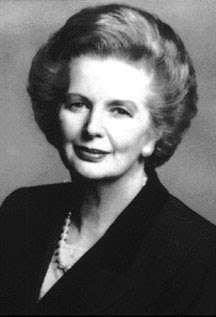 (Margaret Thatcher)
(Margaret Thatcher)Margaret Hilda Thatcher, Baroness Thatcher, LG, OM, PC (née Roberts; born 13 October 1925) served as British Prime Minister from 1979 to 1990 and leader of the Conservative Party from 1975 until 1990, being the first (and, to date, only) woman to hold either post.
Margaret Thatcher was Britain's first female prime minister, and first British prime minister in the twentieth century to win three consecutive terms. A lawyer, Margaret first entered Parliament in 1959, eventually serving in a variety of ministerial posts. In 1974 she was elected leader of the Conservative Party, and brought her party to victory in 1979. Espousing conservative ideals of based on free enterprise, she advocated public spending cuts, limited money supply, and raised interest rates. Her privatization programs led to union opposition, labor unrest, and high unemployment rates. She earned the nickname "The Iron Lady" because of her hard line against the USSR over their invasion of Afghanistan, and because when Argentina challenged Britain's right to the Falkland Islands, she went to war. In 1990 she resigned as prime minister, although she stayed in Parliament until 1992.
Thatcher is still the longest-serving British Prime Minister since Lord Salisbury and had the longest continuous period in office since Lord Liverpool who was prime minister in the early 19th century. She was the first woman to lead a major political party in the UK, and the first of only three women to have held any of the four great offices of state. She currently has a life peerage as Baroness Thatcher, of Kesteven in the County of Lincolnshire, which allows her to sit in the House of Lords.
Margaret Thatcher was Britain's first female prime minister, and first British prime minister in the twentieth century to win three consecutive terms. A lawyer, Margaret first entered Parliament in 1959, eventually serving in a variety of ministerial posts. In 1974 she was elected leader of the Conservative Party, and brought her party to victory in 1979. Espousing conservative ideals of based on free enterprise, she advocated public spending cuts, limited money supply, and raised interest rates. Her privatization programs led to union opposition, labor unrest, and high unemployment rates. She earned the nickname "The Iron Lady" because of her hard line against the USSR over their invasion of Afghanistan, and because when Argentina challenged Britain's right to the Falkland Islands, she went to war. In 1990 she resigned as prime minister, although she stayed in Parliament until 1992.
Thatcher is still the longest-serving British Prime Minister since Lord Salisbury and had the longest continuous period in office since Lord Liverpool who was prime minister in the early 19th century. She was the first woman to lead a major political party in the UK, and the first of only three women to have held any of the four great offices of state. She currently has a life peerage as Baroness Thatcher, of Kesteven in the County of Lincolnshire, which allows her to sit in the House of Lords.
Titles and honours:
Titles Baroness Thatcher has held from birth, in chronological order:
* Miss Margaret Roberts (13 October 1925 – 13 December 1951)
* Mrs Denis Thatcher (13 December 1951 – 8 October 1959)
* Mrs Denis Thatcher, MP (8 October 1959 – 22 June 1970)
* The Rt Hon. Margaret Thatcher, MP (22 June 1970 – 7 December 1990)
* The Rt Hon. Margaret Thatcher, OM, MP (7 December 1990 – 4 February 1991)
* The Rt Hon. Lady Thatcher, OM, MP (4 February 1991 – 16 March 1992)
* The Rt Hon. Lady Thatcher, OM (16 March 1992 – 26 June 1992)
* The Rt Hon. The Baroness Thatcher, OM, PC (26 June 1992 – 22 April 1995)
* The Rt Hon. The Baroness Thatcher, LG, OM, PC (22 April 1995 – )
* Miss Margaret Roberts (13 October 1925 – 13 December 1951)
* Mrs Denis Thatcher (13 December 1951 – 8 October 1959)
* Mrs Denis Thatcher, MP (8 October 1959 – 22 June 1970)
* The Rt Hon. Margaret Thatcher, MP (22 June 1970 – 7 December 1990)
* The Rt Hon. Margaret Thatcher, OM, MP (7 December 1990 – 4 February 1991)
* The Rt Hon. Lady Thatcher, OM, MP (4 February 1991 – 16 March 1992)
* The Rt Hon. Lady Thatcher, OM (16 March 1992 – 26 June 1992)
* The Rt Hon. The Baroness Thatcher, OM, PC (26 June 1992 – 22 April 1995)
* The Rt Hon. The Baroness Thatcher, LG, OM, PC (22 April 1995 – )
Honours
* Lady of the Most Noble Order of the Garter
* Member of the Order of Merit
* Member of Her Majesty's Most Honourable Privy Council
* Fellow of the Royal Society
* Honorary member of the gentlemen's club the Carlton Club, and the only woman entitled to full membership rights.
Foreign honours
- Presidential Medal of Freedom
- Republican Senatorial Medal of Freedom
- Patron of the Heritage Foundation
- Ronald Reagan Freedom Award
- In December 1999 Thatcher was among 18 included in Gallup's List of Widely Admired People of the 20th Century, from a poll conducted of the American people.
* Buckingham University (1992-1998)
* College of William & Mary, Virginia, USA (1993-2000)
To know more about Margaret Thatcher......Click



